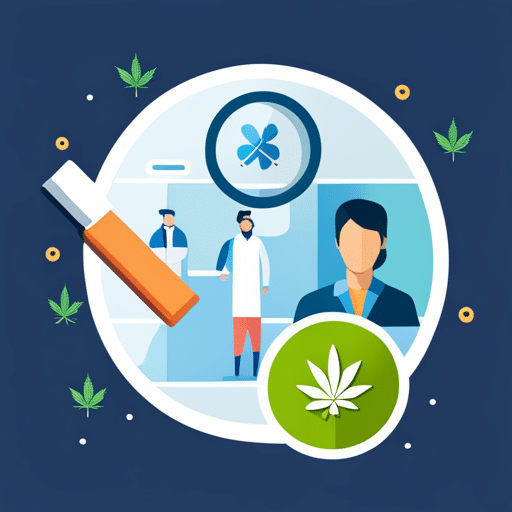The exploration of alternative treatments for health and wellness has seen a surge in recent years, with a growing interest in the potential benefits of cannabinoid medicine. This burgeoning field, centered on the therapeutic properties of cannabinoids – active compounds found within cannabis plants – is rapidly gaining recognition for its capacity to address a multitude of health conditions. In Georgetown, MD, highly respected practitioners are leading the charge by integrating cannabinoid treatments into holistic healthcare practices, offering patients an innovative approach toward improved well-being.
Cannabinoid medicine’s ability to complement traditional treatment modalities contributes significantly to its rising prominence in holistic health regimes. The journey towards finding the right practitioner can be daunting; however, identifying reputable clinicians well-versed in cannabinoid therapies is integral to fully capitalizing on their potential benefits. This article aims to provide readers with a comprehensive understanding of the role cannabinoids play in holistic health while simultaneously shedding light on expert practitioners located in Georgetown, MD. It will also delve into patient testimonials and success stories that serve as tangible evidence of this unique approach’s efficacy.
Understanding the Basics of Cannabinoid Medicine

A deeper exploration into Cannabinoid Pharmacology uncovers how phytocannabinoids (plant-derived) like THC (Tetrahydrocannabinol) and CBD (Cannabidiol) mimic endogenous compounds—endocannabinoids—in our bodies to modulate these receptors. THC binds directly with both types of cannabinoid receptors but has a higher affinity for CB1 receptors causing psychoactive effects. In contrast, CBD indirectly influences these receptors by inhibiting an enzyme that degrades one type of endocannabinoid—anandamide—resulting in increased levels within the Endocannabinoid System. The resulting actions from these complex interactions highlight the potential therapeutic capabilities cannabinoids offer for various health conditions—a testament to why understanding this field is crucial for medical practitioners today.
The Role of Cannabinoids in Holistic Health

Therapeutic Cannabinoid Applications are vast and varied. For instance, CBD (Cannabidiol), one prominent non-psychoactive cannabinoid compound, has demonstrated efficacy in managing anxiety disorders and epilepsy while THC (Tetrahydrocannabinol) shows promise for pain relief and nausea control among chemotherapy patients. Moreover, emerging research suggests the potential application of cannabinoids in mitigating opioid dependence thus offering a safer alternative to conventional drugs. Despite regulatory challenges faced by this field of study, it is evident that continued exploration could lead to significant breakthroughs in holistic health care – offering an empowering path towards well-rounded healing for individuals seeking liberation from affliction.
Finding the Right Practitioner

Upon finding a qualified professional, Appointment Preparation becomes another essential element for successful treatment outcomes. Prior to appointments, patrons should consider preparing detailed medical histories inclusive of all current medications and supplements used to avoid potential interactions with cannabinoids. Furthermore, jotting down any specific questions or concerns can ensure these points are addressed during consultations. To emphasize certain key points while searching for the right cannabinoid doctor and preparing for the initial appointment, refer to the table below:
| Key Aspect | Why It’s Important | How To Prepare |
|---|---|---|
| :—: | :—: | :—: |
| Practitioner Credentials | Affirms professional competency and specialized knowledge in cannabinoid therapies | Research potential practitioners’ qualifications thoroughly; seek professionals certified by recognized bodies |
| Detailed Medical History | Ensures comprehensive understanding of patient’s health status; aids in devising personalized treatment plans | Document all past/present illnesses and surgeries; list all ongoing medications/supplements |
| Specific Queries or Concerns | Facilitates open communication between patient & practitioner; allows personalized guidance based on individual needs | Write down any worries/questions about cannabinoid therapy prior to the appointment |
In conclusion, finding a suitable holistic practitioner skilled in cannabinoid therapies involves careful research into their credentials coupled with adequate preparation before each consultation session.
Potential Benefits of Cannabinoid Treatment

Medical trials are crucial for elucidating the full range of potential benefits offered by cannabinoid treatment and ensuring safety standards are met. As regulations around cannabis usage shift towards acceptance, more extensive research can be conducted leading to refined therapeutic approaches. However, it is noteworthy that while promising results have emerged from various studies worldwide, individual responses may vary significantly due to genetic predispositions and other factors like overall health status or concurrent medication use. Therefore, professional guidance from respected cannabinoid doctors becomes indispensable when considering this form of alternative medicine; they can provide insight into personalized treatments best suited for each patient’s specific needs and circumstances while carefully monitoring any potential side effects or interactions.
Risks and Considerations in Cannabinoid Medicine

Cannabinoid dosage considerations are another pivotal aspect that bears significant weight while contemplating this form of treatment. As with any potent therapeutic agent, determining an appropriate dosage requires careful balancing between achieving desired therapeutic outcomes and minimizing unwanted side effects. It is thus imperative for clinicians to have a clear understanding of each patient’s health background and tolerance levels before prescribing cannabinoids as part of their medical regimen. In addition to these clinical concerns, legal issues surrounding cannabinoids are also important considerations given their variable legality across different jurisdictions around the world. Henceforth, it becomes apparent that careful consideration is needed when choosing cannabinoid treatments as a method for enhancing one’s health status.
Success Stories and Patient Testimonials
Frequently Asked Questions
How long does it usually take to see results from a cannabinoid treatment regimen?
The duration required to observe results from a cannabinoid treatment regimen varies, dependent on individual patient responses, Cannabinoid Dosage Adjustments, and potential Treatment Side effects. Clinical studies suggest several weeks may be necessary for substantial improvement.
Are there any specific dietary guidelines or restrictions to follow while undergoing cannabinoid treatment?
Research on Cannabinoid Food Interactions suggests no specific dietary restrictions during cannabinoid treatment. However, maintaining a balanced diet post-treatment is recommended for overall health. Dietary adjustments may be necessary depending on individual response to the therapy.
What are the qualifications and training of the doctors at Elevate Your Health in Georgetown, MD?
The doctors at Elevate Your Health possess extensive training and qualifications in cannabinoid medicine. Their expertise is corroborated by numerous patient testimonials, indicating a high level of clinical competency and patient-centered care.
Are cannabinoid treatments covered by insurance?
Cannabinoid treatments, while beneficial for certain health conditions, often face insurance loopholes and coverage limitations. While some policies may cover cannabinoid-related therapies, others exclude such treatments due to regulatory complexities and varying state laws.

